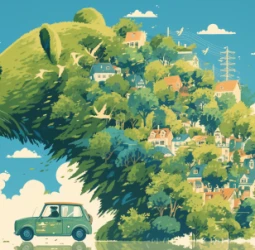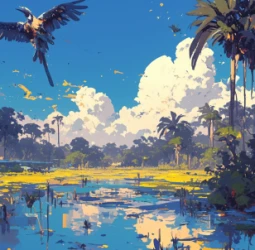The Pantanal Wetlands, located in Brazil, is the largest tropical wetland in the world. Spanning over 140,000 square kilometers, it is a vast and diverse ecosystem that is home to a staggering amount of flora and fauna. However, this natural treasure is under threat due to various factors. In recent years, there has been a growing awareness and effort towards the conservation of the Pantanal Wetlands. Let us delve deeper into the importance of this ecosystem and the steps being taken for its preservation.
The Pantanal Wetlands are a unique and complex ecosystem, comprising of a mosaic of different habitats such as swamps, marshes, and rivers. This diversity of habitats supports an abundance of wildlife, making it a haven for over 3,500 plant and animal species. The wetlands serve as a crucial breeding ground for several endangered species, including the hyacinth macaw, giant otter, and jaguar. It is also a vital stopover for migratory birds, making it an essential site for bird watching. The tourism industry in the Pantanal Wetlands generates millions of dollars in revenue, highlighting its economic significance as well.
However, despite its ecological and economic value, the Pantanal Wetlands are facing numerous threats that put its survival in jeopardy. One of the leading causes of concern is deforestation. The rapid expansion of agriculture, cattle ranching, and infrastructure development have led to significant deforestation in the region. This has not only led to the loss of habitat for wildlife but has also disrupted the delicate balance of the ecosystem. Deforestation also contributes to soil erosion, water pollution, and climate change, all of which have a cascading effect on the wetlands.
Another major threat to the Pantanal Wetlands is pollution. The wetlands are located near industrial and urban centers, making them vulnerable to pollutants from industrial waste and urban runoff. These pollutants not only harm the flora and fauna but also pose a risk to human health. Oil spills in the waterways also pose a significant threat to the wetlands, as they can damage the aquatic ecosystem and contaminate water sources.
To combat these threats, efforts are being made towards the conservation of the Pantanal Wetlands. The Brazilian government has designated a large portion of the wetlands as protected areas, where activities such as hunting, logging, and fishing are prohibited. Organizations such as the WCS (Wildlife Conservation Society) and WWF (World Wildlife Fund) are actively involved in conservation efforts, focusing on habitat protection, wildlife monitoring, and community engagement. These organizations also work with local communities to promote sustainable livelihoods and alternative sources of income, reducing the pressure on the wetlands.
In addition, ecotourism has been gaining popularity in the Pantanal Wetlands, providing a sustainable way to generate income while raising awareness about the importance of conservation. Responsible tourism practices, such as using eco-friendly accommodations and participating in wildlife observation with trained guides, can help minimize the impact on the ecosystem.
In conclusion, the Pantanal Wetlands are a vital and fragile ecosystem that requires immediate attention and action for its conservation. As individuals, we can also contribute to the preservation of this natural wonder by being mindful of our consumption habits and supporting eco-friendly practices. It is crucial to remember that the protection of the Pantanal Wetlands is not just about preserving a beautiful landscape but also ensuring the survival of countless species and the well-being of local communities. Let us all come together and work towards preserving this invaluable natural heritage for generations to come.
The Pantanal Wetlands are a unique and complex ecosystem, comprising of a mosaic of different habitats such as swamps, marshes, and rivers. This diversity of habitats supports an abundance of wildlife, making it a haven for over 3,500 plant and animal species. The wetlands serve as a crucial breeding ground for several endangered species, including the hyacinth macaw, giant otter, and jaguar. It is also a vital stopover for migratory birds, making it an essential site for bird watching. The tourism industry in the Pantanal Wetlands generates millions of dollars in revenue, highlighting its economic significance as well.
However, despite its ecological and economic value, the Pantanal Wetlands are facing numerous threats that put its survival in jeopardy. One of the leading causes of concern is deforestation. The rapid expansion of agriculture, cattle ranching, and infrastructure development have led to significant deforestation in the region. This has not only led to the loss of habitat for wildlife but has also disrupted the delicate balance of the ecosystem. Deforestation also contributes to soil erosion, water pollution, and climate change, all of which have a cascading effect on the wetlands.
Another major threat to the Pantanal Wetlands is pollution. The wetlands are located near industrial and urban centers, making them vulnerable to pollutants from industrial waste and urban runoff. These pollutants not only harm the flora and fauna but also pose a risk to human health. Oil spills in the waterways also pose a significant threat to the wetlands, as they can damage the aquatic ecosystem and contaminate water sources.
To combat these threats, efforts are being made towards the conservation of the Pantanal Wetlands. The Brazilian government has designated a large portion of the wetlands as protected areas, where activities such as hunting, logging, and fishing are prohibited. Organizations such as the WCS (Wildlife Conservation Society) and WWF (World Wildlife Fund) are actively involved in conservation efforts, focusing on habitat protection, wildlife monitoring, and community engagement. These organizations also work with local communities to promote sustainable livelihoods and alternative sources of income, reducing the pressure on the wetlands.
In addition, ecotourism has been gaining popularity in the Pantanal Wetlands, providing a sustainable way to generate income while raising awareness about the importance of conservation. Responsible tourism practices, such as using eco-friendly accommodations and participating in wildlife observation with trained guides, can help minimize the impact on the ecosystem.
In conclusion, the Pantanal Wetlands are a vital and fragile ecosystem that requires immediate attention and action for its conservation. As individuals, we can also contribute to the preservation of this natural wonder by being mindful of our consumption habits and supporting eco-friendly practices. It is crucial to remember that the protection of the Pantanal Wetlands is not just about preserving a beautiful landscape but also ensuring the survival of countless species and the well-being of local communities. Let us all come together and work towards preserving this invaluable natural heritage for generations to come.



 dev1
dev1















